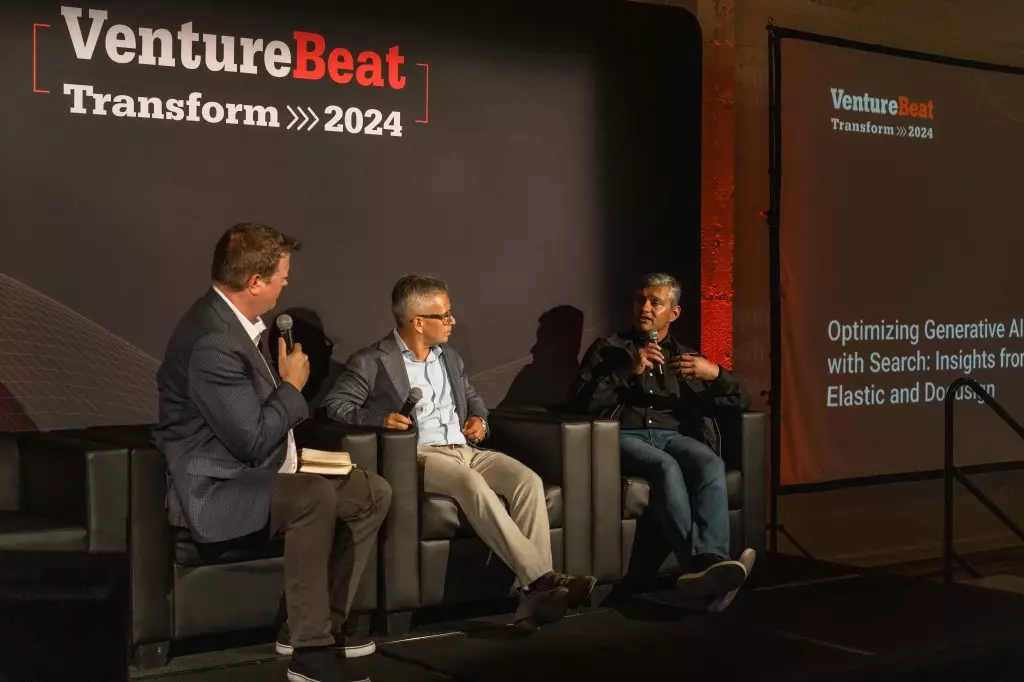In a recent discussion at VentureBeat’s Transform 2024, Elastic CEO Ash Kulkarni and DocuSign CPO Dmitri Krakovsky shed light on how generative AI is reshaping enterprise search and contract management. The conversation underscored the increasing significance of AI-powered search capabilities for businesses grappling with extensive data volumes and intricate contractual relationships. One notable advancement in Elastic’s enterprise search approach has been the incorporation of generative AI.
Elastic unveiled the Elasticsearch Relevance Engine (ESRE) in May 2023, signaling a significant shift in its search technology strategy. ESRE merges traditional keyword-based search methods with advanced vector search capabilities, allowing for a more nuanced comprehension of context and semantics within vast data repositories. This hybrid methodology equips Elastic to provide its clients with more sophisticated techniques to retrieve pertinent documents from their Elasticsearch stores, whether through vector search, text search using BM25, or a fusion of techniques.
Kulkarni elaborated on the company’s progress in integrating retrieval augmented generation (RAG) into its vector database technology, emphasizing the comprehensive capabilities now accessible to clients. Elastic’s commitment to flexibility and developer choice was reinforced by Kulkarni, who emphasized the importance of providing developers with a range of options and functionalities. The rapid evolution of AI necessitates careful consideration of model selection, as noted by Kulkarni, who highlighted the trend of distributing queries to different large language models to optimize accuracy and cost.
In parallel, DocuSign is leveraging AI to revolutionize contract management processes. Krakovsky outlined their vision of utilizing AI agents to facilitate contract negotiations, hinting at a future where AI actively participates in contractual discussions. The Intelligent Agreement Management (IAM) platform aims to convert static contract data into actionable insights using core components like Maestro, Navigator, and App Center, working in synergy to analyze contracts.
Krakovsky highlighted the gap in enterprise digitization when it comes to contracts, emphasizing the challenges in reasoning, querying, and understanding contract terms at scale. IAM’s capacity to transform static PDFs into structured, analyzable data was exemplified by a scenario where a customer saved over $100 million by identifying inconsistencies and opportunities across 70 contracts with a system integrator. This exemplifies the potential of IAM to streamline contract management from a labor-intensive endeavor to a strategic business function.
Responsible AI Adoption
Both Kulkarni and Krakovsky emphasized responsible AI adoption as a cornerstone of their strategies. Acknowledging the sensitivity of data like contracts, and the need for caution when deploying AI technologies, DocuSign prioritizes data security and transparency in its approach. Krakovsky underscored the importance of delivering end-to-end solutions rather than fragmented offerings, a sentiment echoed by Kulkarni, who highlighted the need for developer choice and openness in model selection.
Moreover, cost optimization emerged as a pivotal factor in AI adoption, with Krakovsky emphasizing the importance of resource optimization and efficient resource utilization to enhance the value derived from AI solutions. Kulkarni predicted a decrease in the cost of inference, driven by technological advancements and competition in the realm of large language models. Looking ahead, the executives discussed the expanding capabilities of AI, including multimodal AI models and AI applications in contract management.
The conversation also delved into real-world applications of AI in enterprise settings, citing examples of how Elastic’s technology has been leveraged by organizations like Cisco to automate tasks and enhance customer support. In the financial sector, a Fortune 100 bank is utilizing Elastic to transform the interactions between wealth managers and clients, creating a more personalized and informed experience akin to a “one-person Bloomberg terminal.”
While the potential applications of generative AI in enterprise search and contract management are vast, addressing technical, ethical, and operational challenges is imperative. Data privacy, model transparency, and cost-effective scaling are key considerations in navigating the complexities of AI adoption in these domains. The dialogue between Kulkarni and Krakovsky underscored the transformative impact of AI technologies while emphasizing the need for responsible and strategic deployment in enterprise contexts.


Leave a Reply
You must be logged in to post a comment.